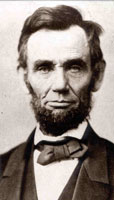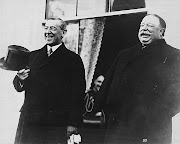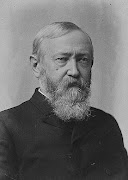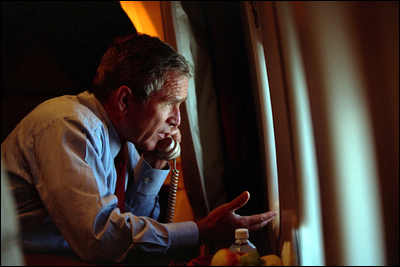
(Written February 2007, updated January 2009)
Years in office: 1797-1801
Pre-service occupations: delegate to the first and second Continental Congresses, minister plenipotentiary, vice president
Key events during his administration: Quasi-war with France (1798-1800), Alien and Sedition Acts (1798), John Marshall appointed to the Supreme Court (1800)
Nicknames: The Duke of Braintree, the Colossus of Debate (bestowed by Jefferson), Old Sink or Swim
Presidential rating: Mildly successful, and somewhat unpopular
ESSAY
“Sit down, John!” are the first words that come to mind when I hear the name “John Adams.” The words aren’t spoken, either. They’re sung.
If you have seen the quirky musical, “1776,” you’ll recall a line-dancing Benjamin Franklin and the rest of the Continental Congress demanding that William Daniels’ outspoken Adams “sit down!” once more.
Fortunately, popular historian David McCullough has given us a less silly popular portrait of America’s second president for the modern era. (2008 note: HBO made an outstanding and Emmy-winning miniseries from McCullogh’s book, starring Paul Giamatti and Laura Linney, which fortunately now supplants William Daniels’ singing and dancing Adams.)
John Adams was a founding father, one of the key players of the Revolution and the formation of the country. He was a brilliant man—and had an even more brilliant wife, Abigail, who was his love, friend and sounding board. As Washington’s vice president, he, along with Hamilton, was a founder of the Federalists and an often bitter rival of Thomas Jefferson. His ideas still resonate today, though people—unfortunately, in some ways—tend to reach back more to Jefferson than to Adams. His family proved to be a dynasty: his cousin was fellow Patriot Samuel Adams, his son became the sixth president, his grandson played a key role in keeping England out of the Civil War, and his great-grandson, Henry Adams, became one of America’s most celebrated men of letters (The Education of Henry Adams).
He also bears the distinction of being the only one-term president and only non-Virginian amid the “Virginia dynasty” of Washington, Jefferson, Madison and Monroe—which was ended, fittingly enough, by his own son, also a one-term president.
A philosopher, but no monarchist
It’s difficult two write about Adams without including Jefferson and vice-versa, because the two men represented such polar opposites—but neither could convince the other of his sincerity. Adams’ biographer in The America Presidents series, John Patrick Diggins, describes the second president as being one of the three leading thinkers of the age:
“Hamilton was a mercantilist who believed in the fusion of state and economy, Jefferson an individualist who believed in the sovereignty of the people, Adams a constitutionalist who believed in the efficacy of government. Hamilton looked to the oligarchial few who would be motivated by responsibility, Jefferson to the democratic many who would guard freedom with jealousy, Adams to the single executive who would preserve liberty by relying on the government and its ‘machinery.’”
This vision in triplicate was difficult to reconcile, though somehow we’ve been managing to do so for more than 225 years. Of course, Hamilton and Adams found more common ground, though the two split after Adams became president because he felt Hamilton too closely tied to money while Hamilton believed himself to be the heir-apparent to Washington. Adams believed strongly in “the machinery of government” to keep people virtuous and was suspicious of Jefferson’s equally strong belief that common people (e.g., white, propertied men) could be virtuous if left “unmolested” by government. Adams believed strongly in the republican form of government, and was suspicious of the masses—of “democracy,” which he believed Jefferson was all for. Neither had a complete vision, however.
John Adams was the closest man to a philosopher we’ve ever had in the presidency. He was a political philosopher, the only man besides Woodrow Wilson to pen a political treatise before he became president (not counting Madison, who co-wrote The Federalist). In a couple of ponderous and dense works—probably never even read by his political enemies—Adams laid out his understanding of constitutional/republican government and defended America against European monarchy and later the French Revolution. He viewed the state as the arbiter of justice between conflicting factions and the preserver of human liberty. But Adam’s enemies, mainly his one-time friend Jefferson, used them and Adams’ actions as fodder that he was a closet monarchist seeking to set up an American version of royalty. Jefferson’s fears—many of them stated privately or whispered to hurt Adams publicly—of Adams’ supposed love of monarchy and European aristocracy wound up dinging Adams’ presidency badly. But Jefferson was chasing a phantom menace—a “reverse red scare,” as Diggins put it—that would nevertheless help destroy the Federalists as a party in 1800.
However, Adams was no monarchist. Instead, he thought that the central government should have some measure of decorum and strength. More to the point, Adams believed in a strong executive providing balance between democracy and aristocracy, between the “credulous many” and the “artful few,” writes Diggins. While the framers of the Constitution saw the legislative branch as the base of power uniting the scattered and disconnected country, Adams (in Europe during the constitutional debates) viewed the chief executive as fulfilling that role. The executive, he argued, could alone unite the fragmented country, but it was his focus on the executive that fueled his enemies’ fears/fantasies of monarchy. His own party didn’t help matters by propagating the idea of a governing elite, which smacked too much of the old ways for the radical Jefferson and his followers.
In addition, Adams was abhorred by the excesses of the French Revolution, of which Jefferson and his compatriots believed should have been treated as a companion piece to the American Revolution. Opposition to the French Revolution was no small thing, because for the Francophiles, it seemed to make no sense to be all for the spirit of ’76 but against the spirit of 1789 in France. To the Jeffersonians, if you opposed the French Revolution, you ultimately opposed the American Revolution. (Though to be fair to Jefferson, by 1800 he did back off from his whole-hearted embrace of France’s revolution.) This division played a role in the election of 1796 and all throughout Adam’s presidency and only furthered the division between the Republicans (the Jeffersonians) and the Federalists led by Adams and Hamilton, who would soon split themselves.
So that’s the set-up. With that in mind, what kind of president did Adams make? Has history treated this man kindly? There’s obviously much interest surrounding him, otherwise McCullough’s biography—which largely omitted Adams’ denser political theories in favor of narrative excitement—would have bombed faster than most movies about the Revolution.
Out from Washington’s long shadow
Unlike many seekers of the presidency today, John Adams didn’t look upon the executive position as the culmination of his life’s ambition. Instead, he viewed it as one part of the journey. (The climax had been the Revolution, and nothing would ever top that.)
Under the now-anachronistic election rules, the election of 1796 made Adams president and Jefferson vice president. Talk about having a snake in the house. (Imagine if Bill Clinton’s vice president had been Newt Gingrich, or Ronald Reagan’s had been Ted Kennedy.) But while Adams couldn’t control who his vice president was, he could control his cabinet. The Massachusetts thinker kept Washington’s cabinet members at state, war and the treasury—three men who really weren’t all that good at their jobs, but they were the replacements for the final years of Washington’s second term. Adams retained them supposedly to help establish some continuity in civil service, but they proved to be a burden to him—and he really only used them as sounding boards anyway. And there is some belief that his cabinet, while not quite treasonous, was working against him. It seems that while Adams was quite prescient it talking about government, he was sometimes rather poor at recognizing when he was the object of opposition.
Adams as president liked to keep his own counsel, in holding with his idea of the strong executive, but this often worked to his detriment as it created an air of indecisiveness—quite different from Washington. He didn’t help himself when he often retreated to his home in Quincy, Mass.
While Washington’s presidency was, for all intents and purposes the “honeymoon” period for America, Adams’ was the one where things truly got nasty. And unfortunately for him, almost every major action in his entire term in office had something to do with France.
Francophiles versus Anglophiles
Presidents are supposed to get a honeymoon period, according to modern politics, but Adams got socked in the face right from the start. France, embroiled in its own revolution, was none too happy with Washington’s Jay Treaty, which France’s Directorate viewed as an alliance with England, though it was nothing of the sort. The French had begun preying on American shipping in 1796, before Washington left office. French ships were hitting American shipping, taking crews, ships and cargo bound for England ostensibly as “payment” for services rendered during the Revolution. Then, they refused to receive America’s diplomats.
On his inauguration night, Adams wanted a bipartisan commission to go to France—meaning, both Federalists and Republicans (Jeffersonians)—but Jefferson declined and he assured Adams that Madison would too. This marked the final rift between Adams and Jefferson.
Events exploded with France in 1798 when President Adams revealed the infamous “XYZ Affair.” France’s Talleyrand and his agents demanded large bribes from America’s ministers; in return, they’d be happy to restore normal relations with the United States. When Adams made the attempted bribery public, outrage grew and his popularity reached its zenith. War was called for—even as the Republicans were vehemently opposed because they saw such a war playing right into British hands. Adams called for the establishment of a standing U.S. Navy and a standing U.S. Army—both of which Jefferson despised, because of course, to him, they smacked of monarchy and elitist control. But Congress, controlled by the Federalists, agreed, and established both. New ships were laid down and an army of 10,000 men was inaugurated. (The army was ostensibly created to fight the French, and although it was never used for this purpose, it outlasted the stated reason for its creation.)
The “Quasi-War” with France was never declared, but it lasted two years, from 1798-1800. The U.S. Navy captured 85 French ships and privateers. The United States was technically fighting alongside England, but neither navy cooperated in any significant way. In the end, Napoleon, now ruler of France, agreed to a settlement because the conflict with America was doing him no good. But the undeclared war sharpened the divisions between the two dominant factions in America.
Truly bad law?
But perhaps the one thing that did Adams in as president was the Alien and Sedition Acts. Adams had less to do with them than the Federalist congress, but they did bear his signature. And there is some evidence that Abigail was one of the drivers behind them. Regardless, they are forever associated with John Adams. There were four laws:
- The Naturalization Act extended the duration of residence required for aliens to become citizens, from five years to 14, repealed in 1802.
- The Alien Friends Act authorized the president to deport any resident alien considered “dangerous to the peace and safety of the United States,” expired in 1800.
- The Alien Enemies Act authorized the president to apprehend and deport resident aliens if their home countries were at war with the United States. Enacted July 6, 1798. This act remains in effect today as 50 USC Sections 21-24.
- The Sedition Act made it a crime to publish “false, scandalous, and malicious writing” against the government or its officials; expired March 3, 1801.
The Sedition Act was the one that caused the most consternation, and with good reason. Biographer Diggins writes that:
“In American history, almost every important presidency has had its one moment of deep regret, an action taken that might have been avoided, one that backfired and played into the hands of the opposition.”
This was Adams’ moment, for it definitely played into Jefferson’s and his allies’ hands, and it likely lead directly to the end of the Federalists as a party and the end of Adams’ political career. Most certainly it was an assault on free speech, an attempt to silence criticism of the government, as Republicans rightfully charged. (Jefferson, as an aside, greatly overreached in his rebuttal, using his stealth support to create resolutions to nullify the laws in Kentucky and Virginia, and failing that, leaving the union. There was little support outside of those states, but it is fair to say that Jefferson is the originator of nullification and secession, which would bedevil the United States 60 years later!)
Some Jefferson fans have gone so far to paint this as a mini “reign of terror,” which is a ludicrous stretch. Because while the acts were rarely enforced—some Francophiles did flee the country—and Adams never signed a deportation order, the damage was done, and Adams’ reputation suffered, along with his party.
Adams relations with his own party were not good, either. Adams had reluctantly agreed to Hamilton as commander of the new army. But in a sign of bipartisan support, he sought Democrat-Republican Aaron Burr as second-in-command, but short-sighted Federalists refused—which deepened the already terrible suspicions of the Jeffersonians and would help to seal the fate of the Federalists.
Courageous acts
When the Federalist-controlled Congress passed a tax on property (the first-ever) to help support the Quasi-War, there was a mini-rebellion in western Pennsylvania. Federal property surveyors were harassed, and in response, several men were arrested. A man by the name of Fries organized a small mob to free the men. Having done so, they disbursed.
This was nothing more than a tax revolt—as American as apple pie and hot fudge sundaes, Diggins writes—but outraged super-Federalists acted as if it were treason against the government. The Federalists greatly over-reacted; Fries and 60 others were brought to Philadelphia to be tried on treason or other charges, and Fries himself was sentenced to be hanged. But Adams shocked his party by pardoning Fries, saying that he and his cohorts had engaged in a rebellion, not an insurrection against the government. Despite the pardon, the whole sorry affair turned stalwart Federalist western Pennsylvania solidly against Adams and his party.
Adams’ pardon was a courageous act—going against his entire cabinet and party—and it cost him their support.
The final nail in the political coffin for the Federalists as far as Adams was concerned was how he ended the Qausi-War: by assigning a diplomat to France to re-open relations with that country, now that the Directorate was gone (replaced by Napoleon) and ending the whole affair. (McCullough calls this Adams’ most courageous act as president.) Federalists wanted war! with France, not peace. But Adams, never one to believe in war for war’s sake, wanted the matter ended. And so it was.
So, by the end of his presidency, Adams was something of a man alone. He was distrusted by his own party—mainly because he wasn’t “pure” enough—but he nevertheless still managed to narrowly lose to Jefferson in a several-man race for the electoral vote.
A brilliant jurist
In one of his last acts as president, John Adams appointed John Marshall to be Chief Justice of the Supreme Court. He would prove to be one of the greatest jurists to ever serve the country. It was a smart choice, and one not made blindly. A Federalist ally—and Adams’ last secretary of state—Marshall was the longest-serving chief justice who also established the principle of judicial review and fashioned the judiciary as independent of the executive and legislative branches. He was a foe of Jeffersonianism throughout his tenure, which lasted until 1835.
The charge persists, especially among Jefferson fans, that Adams made a slew of “midnight,” or last-minute, appointments to bedevil Jefferson after Adams left office. Whether true or not, it’s hard to dispute the power of the Marshall appointment.
Final Assessment
I’ve often heard that Woodrow Wilson was the smartest man who has ever been president. I’m not so sure. It might have been Adams. Jefferson was brilliant and learned in many ways, but I don’t quite think he was as smart as he thinks he was.
Adams came to the presidency less qualified—in the modern understanding—for the office than any other man, yet he was more prepared for the office than any other, because he understood the office better than any of them and also believed wholeheartedly in the necessary power of the office. Yet understanding the presidency from a politically philosophical point of view did not necessarily translate into his being able to wield it as well as he needed to. He proved less deft at the political game than Jefferson (or perhaps less devious).
In his call for a strong executive, Adams anticipated the “imperial presidency” of modern America. His actions also ensured that when America finally fought a second war with England, we actually had an army and navy. If Jefferson and the Republicans had had their way, the War of 1812 could have been much more of a disaster—and possibly even the end of America. Is it a stretch to say that? Perhaps.
But Adams looked ahead—far ahead. His mind was often not on the immediate, but on the future. He wanted to make sure what he built endured, so he was often the victim of men like Jefferson and Madison—and even Hamilton. (But Abigail was watchful.) Adams would demand proof of his political enemies’ charges, instead of counter-attacking; but politics doesn’t wait for proof to emerge, because lies can take hold far faster than truth, especially when truth is not vigorously defended.
In the final assessment, Adams the president deserves a place almost equal to Adams the founding father. His political theories, which he put into practice as president, helped assure that the United States would be a democratic-republic, and not just the “for the people” democracy that the Jeffersonians thought that they wanted. And Jefferson unwittingly owed the success of his presidency to the very political philosophy that he repeatedly attacked in Adams!
Adams lost in the tough and disputed election of 1800, and his defeat can be seen as a rebuke of his policies—mainly the Alien and Sedition Acts, the Fries affair and the simple fact that he was unable to defend himself against scurrilous charges of monarchy. But his legacy endured with republicanism (small “r”), the Marshall appointment, a more permanent army (though Jefferson would meddle with that) and beefed up navy, and refusing to bow to other nations just because they were allies. Jefferson and his allies succeeded in undoing much of Federalism, but they couldn’t touch Adams’ true successes; therefore, Adams should rate as a mildly successful president—albeit one who was not popular.
One final note: Adams’ presidential reputation has been enjoying something of a renaissance, thanks to McCullough, an earlier work by Joseph Ellis, and Diggins’ biography, all of which challenge the conventional academic wisdom of President Adams and his era. After all, the election of 1800 was not quite the “second American Revolution” as Jefferson hailed it as being, but rather a different type of glorious event: the affirmation that the American experiment could and would succeed. Power had been peacefully transferred between two antagonistic parties without a shot being fired.
That, ultimately, is President John Adams’ legacy.
Final assessment: Mildly successful and somewhat unpopular.
Resources
Two recent books are definitely worth your time. To understand Adams’ political theories, read John Patrick Diggins, John Adams, (2003) part of the American Presidents series. To get the full flavor of the man, read David McCullough’s superb John Adams (2001). You could also get an excellent illustration through the HBO miniseries of the same name.
Illustration
The picture is from the official White House portrait.








2 comments:
Looks good, Big Mo. I put it in my "favorites" so I can check it out throughout the year.
I'm interested to see what you come up with when you get to Lincoln--he isn't unanimously praised as one of our best presidents. I've thought that till recent years, but now I know there are many, many people who think he's one of our worst--that he undermined our Constitution and did away with federalism, in a very cynical, calculated fashion and without any true concern for the slaves.
Adams may have been as smart as Jefferson, but Jefferson's prose is better written.
Post a Comment